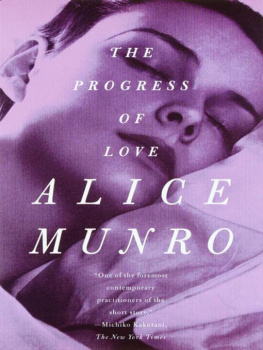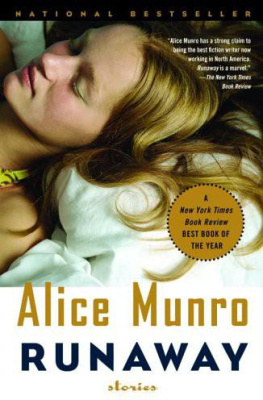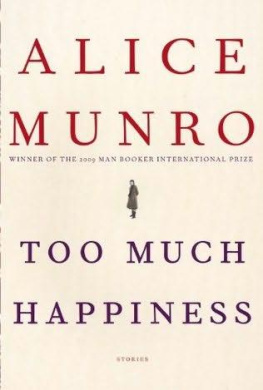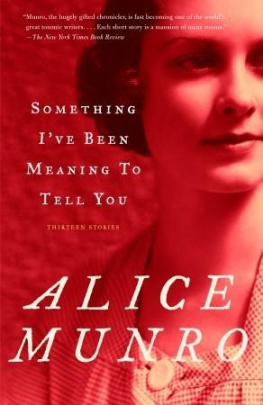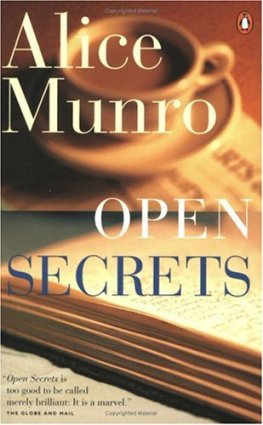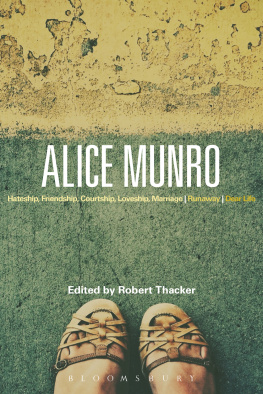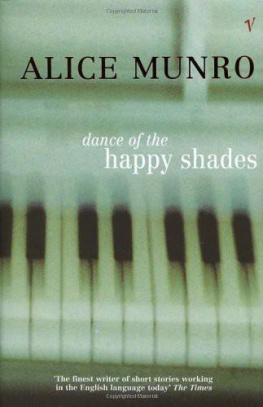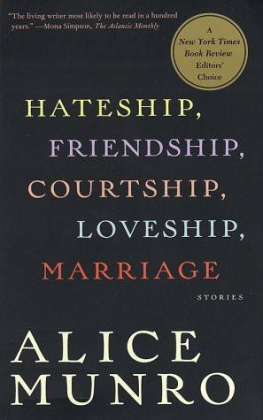Alice Munro
Alice Munro grew up in Wingham, Ontario, and attended the University of Western Ontario. She has published twelve collections of stories and two volumes of selected stories, as well as a novel. During her distinguished career she has been the recipient of many awards and prizes, including three of Canadas Governor Generals Literary Awards and two of its Giller Prizes, the Rea Award for the Short Story, the Lannan Literary Award, Englands W. H. Smith Book Award, the United States National Book Critics Circle Award, the Edward MacDowell Medal in literature, and the Man Booker International Prize. Her stories have appeared in The New Yorker, The Atlantic Monthly, The Paris Review , and other publications, and her collections have been translated into thirteen languages. Alice Munro lives in Clinton, Ontario, near Lake Huron.

Also by Alice Munro
The View from Castle Rock
Carried Away
Runaway
Hateship, Friendship, Courtship, Loveship, Marriage
The Love of a Good Woman
Selected Stories
Open Secrets
Friend of My Youth
The Progress of Love
The Moons of Jupiter
The Beggar Maid
Something Ive Been Meaning to Tell You
Lives of Girls and Women
Dance of the Happy Shades

FIRST VINTAGE INTERNATIONAL EDITION, DECEMBER 2000
Copyright 1985, 1986 by Alice Munro
All rights reserved under International and Pan-American Copyright Conventions. Published in the United States by Vintage Books, a division of Random House, Inc., New York. Originally published in the United States by Alfred A. Knopf, a division of Random House, Inc., New York, in 1986.
Vintage is a registered trademark and Vintage International and colophon are trademarks of Random House, Inc.
A number of stories in this collection (some in slightly different form) were originally published in the following: Eskimo in Gentlemens Quarterly; Monsieur les Deux Chapeaux and Fits in Grand Street; A Queer Streak in Granta; Jesse and Meribeth (originally titled Secrets Between Friends) in Mademoiselle; The Progess of Love, Lichen, Miles City, Montana, The Moon in the Orange Street Skating Rink, and White Dump in The New Yorker; and Circle of Prayer in The Paris Review .
Grateful acknowledgment is made to Diplomat Music Corporation for permission to reprint an excerpt from Today by Lenny Stack and Janelle Cohen from the film C. C. & Co . Reprinted by permission.
The Library of Congress has cataloged the Knopf edition as follows:
Munro, Alice.
The progress of love.
p. cm.
I. Title.
PR9199.3.M8P7 1986
813.54 86-45281
eISBN: 978-0-307-81456-2
Author photograph Jerry Bauer
v3.1
For my sister, Sheila CONTENTS

T HE P ROGRESS OF L OVE
I got a call at work, and it was my father. This was not long after I was divorced and started in the real-estate office. Both of my boys were in school. It was a hot enough day in September.
My father was so polite, even in the family. He took time to ask me how I was. Country manners. Even if somebody phones up to tell you your house is burning down, they ask first how you are.
Im fine, I said. How are you?
Not so good, I guess, said my father, in his old wayapologetic but self-respecting. I think your mothers gone.
I knew that gone meant dead. I knew that. But for a second or so I saw my mother in her black straw hat setting off down the lane. The word gone seemed full of nothing but a deep relief and even an excitementthe excitement you feel when a door closes and your house sinks back to normal and you let yourself loose into all the free space around you. That was in my fathers voice, toobehind the apology, a queer sound like a gulped breath. But my mother hadnt been a burdenshe hadnt been sick a dayand far from feeling relieved at her death, my father took it hard. He never got used to living alone, he said. He went into the Netterfield County Home quite willingly.
He told me how he found my mother on the couch in the kitchen when he came in at noon. She had picked a few tomatoes, and was setting them on the windowsill to ripen; then she must have felt weak, and lain down. Now, telling this, his voice went wobblymeandering, as you would expectin his amazement. I saw in my mind the couch, the old quilt that protected it, right under the phone.
So I thought I better call you, my father said, and he waited for me to say what he should do now.
My mother prayed on her knees at midday, at night, and first thing in the morning. Every day opened up to her to have Gods will done in it. Every night she totted up what shed done and said and thought, to see how it squared with Him. That kind of life is dreary, people think, but theyre missing the point. For one thing, such a life can never be boring. And nothing can happen to you that you cant make use of. Even if youre racked by troubles, and sick and poor and ugly, youve got your soul to carry through life like a treasure on a platter. Going upstairs to pray after the noon meal, my mother would be full of energy and expectation, seriously smiling.
She was saved at a camp meeting when she was fourteen. That was the same summer that her own mothermy grandmotherdied. For a few years, my mother went to meetings with a lot of other people whod been saved, some whod been saved over and over again, enthusiastic old sinners. She could tell stories about what went on at those meetings, the singing and hollering and wildness. She told about one old man getting up and shouting, Come down, O Lord, come down among us now! Come down through the roof and Ill pay for the shingles!
She was back to being just an Anglican, a serious one, by the time she got married. She was twenty-five then, and my father was thirty-eight. A tall good-looking couple, good dancers, good card-players, sociable. But serious peoplethats how I would try to describe them. Serious the way hardly anybody is anymore. My father was not religious in the way my mother was. He was an Anglican, an Orangeman, a Conservative, because thats what he had been brought up to be. He was the son who got left on the farm with his parents and took care of them till they died. He met my mother, he waited for her, they married; he thought himself lucky then to have a family to work for. (I have two brothers, and I had a baby sister who died.) I have a feeling that my father never slept with any woman before my mother, and never with her until he married her. And he had to wait, because my mother wouldnt get married until she had paid back to her own father every cent he had spent on her since her mother died. She had kept track of everythingboard, books, clothesso that she could pay it back. When she married, she had no nest egg, as teachers usually did, no hope chest, sheets, or dishes. My father used to say, with a somber, joking face, that he had hoped to get a woman with money in the bank. But you take the money in the bank, you have to take the face that goes with it, he said, and sometimes thats no bargain.
The house we lived in had big, high rooms, with dark-green blinds on the windows. When the blinds were pulled down against the sun, I used to like to move my head and catch the light flashing through the holes and cracks. Another thing I liked looking at was chimney stains, old or fresh, which I could turn into animals, peoples faces, even distant cities. I told my own two boys about that, and their father, Dan Casey, said, See, your moms folks were so poor, they couldnt afford TV, so they got these stains on the ceilingyour mom had to watch the stains on the ceiling! He always liked to kid me about thinking poor was anything great.
Next page
